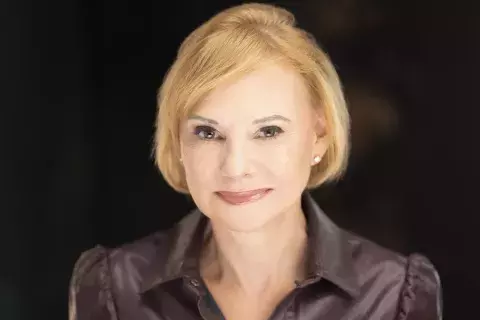
OFFICE/DEPARTMENT
University of Alaska Fairbanks, in partnership with the East-West Center in Washington, presents
Breaking New Ice: US Indo-Pacific Partners and the Arctic
An event in the series: "The Indo-Pacific and the Arctic: Opportunities and Challenges for US Partners"
A conversation with:
Dr. Rebecca Pincus
Director, Polar Institute
Woodrow Wilson International Center for Scholars
Sherri Goodman
Senior Fellow, Polar Institute and Environmental Change & Security Program
Woodrow Wilson International Center for Scholars
Dr. Elizabeth Wishnick (Moderator)
Senior Research Scientist, China and Indo-Pacific Security Affairs Division
Center for Naval Analyses
The US Indo-Pacific Strategy aims to develop coalitions that pursue common goals outside the region as well as within it. Although the US Arctic Strategy prioritizes cooperation with Arctic allies in sustainable resource development and governance, US Indo-Pacific partners (Japan, South Korea, India, and Singapore) also share these goals as well as our concern over deepening Sino-Russian collaboration in Arctic resource governance and trade. The first dialogue in our series examines perspectives from two US scholars and former officials on the potential role for US Indo-Pacific partners in the governance of resources and trade in the Arctic. The speakers will explore the potential for greater cooperation with these partners in the North Pacific Arctic and they will discuss the possible impact of such collaboration on Arctic resource and trade governance.
SPEAKER BIOGRAPHIES

Dr. Rebecca Pincus is Director of the Polar Institute at the Wilson Center in Washington, DC. Previously, she was on the faculty at the US Naval War College, in the Center for Naval Warfare Studies, where her research focused on Arctic security and geopolitics. She also worked in the Office of the Secretary of Defense for Policy, as Arctic and Climate Strategy Advisor. In 2015, she was a Fulbright Fellow in Iceland, conducting research on Arctic small states and security. She also worked on polar strategy and policy issues for the US Coast Guard, at its Center for Arctic Study and Policy, and served on the faculty at the US Coast Guard Academy. She is currently a contributing author for the 5th National Climate Assessment. She has testified before Congress and the US-China Commission on security and defense in the polar regions, and her research has been published widely in peer-reviewed and popular outlets.

Sherri Goodman, Senior Fellow at the Wilson Center’s Environmental Change and Security Program and Polar Institute, and Secretary General of the International Military Council on Climate & Security, is credited with educating a generation of U.S. military and government officials about the nexus between climate change and national security, using her famous coinage, “threat multiplier,” to fundamentally reshape the national discourse on the topic. Sherri serves as Vice Chair of the Secretary of State's International Security Advisory Board and on the EXIM Bank's Council on Climate. A former first Deputy Undersecretary of Defense (Environmental Security) and staff member on the Senate Armed Services Committee, Goodman has founded, led, or advised nearly a dozen research organizations on environmental and energy matters, national security, and public policy.

Elizabeth Wishnick (moderator) is a Senior Research Scientist in the China and Indo-Pacific Security Affairs Division at the Center for Naval Analyses, on leave from her position as Professor of Political Science at Montclair State University. Since 2002, she has been a research scholar at WEAI. She previously taught undergraduate and graduate courses in international relations, Chinese politics, and Chinese foreign policy at Barnard College, Columbia College, and SIPA. Dr. Wishnick has dual regional expertise on China and Russia and is an expert on Chinese foreign policy, Sino- Russian relations, Northeast Asian and Central Asian security, and Arctic geopolitics. Her book project, China’s Risk China’s Risk: Energy, Water, Food and Regional Security (forthcoming Columbia University Press) addresses the security consequences of energy, water and food risks in China for its Eurasian neighbors, a topic she explores in a related policy blog, www.chinasresourcerisks.com. She received a PhD in Political Science from Columbia University, an MA in Russian and East European Studies from Yale University, and a BA from Barnard College. She speaks Mandarin, Russian, and French.

The views expressed by this event's participants do not necessarily reflect those of the East-West Center.
University of Alaska Fairbanks, in partnership with the East-West Center in Washington, presents
Breaking New Ice: US Indo-Pacific Partners and the Arctic
An event in the series: "The Indo-Pacific and the Arctic: Opportunities and Challenges for US Partners"
A conversation with:
Dr. Rebecca Pincus
Director, Polar Institute
Woodrow Wilson International Center for Scholars
Sherri Goodman
Senior Fellow, Polar Institute and Environmental Change & Security Program
Woodrow Wilson International Center for Scholars
Dr. Elizabeth Wishnick (Moderator)
Senior Research Scientist, China and Indo-Pacific Security Affairs Division
Center for Naval Analyses
The US Indo-Pacific Strategy aims to develop coalitions that pursue common goals outside the region as well as within it. Although the US Arctic Strategy prioritizes cooperation with Arctic allies in sustainable resource development and governance, US Indo-Pacific partners (Japan, South Korea, India, and Singapore) also share these goals as well as our concern over deepening Sino-Russian collaboration in Arctic resource governance and trade. The first dialogue in our series examines perspectives from two US scholars and former officials on the potential role for US Indo-Pacific partners in the governance of resources and trade in the Arctic. The speakers will explore the potential for greater cooperation with these partners in the North Pacific Arctic and they will discuss the possible impact of such collaboration on Arctic resource and trade governance.
SPEAKER BIOGRAPHIES

Dr. Rebecca Pincus is Director of the Polar Institute at the Wilson Center in Washington, DC. Previously, she was on the faculty at the US Naval War College, in the Center for Naval Warfare Studies, where her research focused on Arctic security and geopolitics. She also worked in the Office of the Secretary of Defense for Policy, as Arctic and Climate Strategy Advisor. In 2015, she was a Fulbright Fellow in Iceland, conducting research on Arctic small states and security. She also worked on polar strategy and policy issues for the US Coast Guard, at its Center for Arctic Study and Policy, and served on the faculty at the US Coast Guard Academy. She is currently a contributing author for the 5th National Climate Assessment. She has testified before Congress and the US-China Commission on security and defense in the polar regions, and her research has been published widely in peer-reviewed and popular outlets.

Sherri Goodman, Senior Fellow at the Wilson Center’s Environmental Change and Security Program and Polar Institute, and Secretary General of the International Military Council on Climate & Security, is credited with educating a generation of U.S. military and government officials about the nexus between climate change and national security, using her famous coinage, “threat multiplier,” to fundamentally reshape the national discourse on the topic. Sherri serves as Vice Chair of the Secretary of State's International Security Advisory Board and on the EXIM Bank's Council on Climate. A former first Deputy Undersecretary of Defense (Environmental Security) and staff member on the Senate Armed Services Committee, Goodman has founded, led, or advised nearly a dozen research organizations on environmental and energy matters, national security, and public policy.

Elizabeth Wishnick (moderator) is a Senior Research Scientist in the China and Indo-Pacific Security Affairs Division at the Center for Naval Analyses, on leave from her position as Professor of Political Science at Montclair State University. Since 2002, she has been a research scholar at WEAI. She previously taught undergraduate and graduate courses in international relations, Chinese politics, and Chinese foreign policy at Barnard College, Columbia College, and SIPA. Dr. Wishnick has dual regional expertise on China and Russia and is an expert on Chinese foreign policy, Sino- Russian relations, Northeast Asian and Central Asian security, and Arctic geopolitics. Her book project, China’s Risk China’s Risk: Energy, Water, Food and Regional Security (forthcoming Columbia University Press) addresses the security consequences of energy, water and food risks in China for its Eurasian neighbors, a topic she explores in a related policy blog, www.chinasresourcerisks.com. She received a PhD in Political Science from Columbia University, an MA in Russian and East European Studies from Yale University, and a BA from Barnard College. She speaks Mandarin, Russian, and French.

The views expressed by this event's participants do not necessarily reflect those of the East-West Center.










